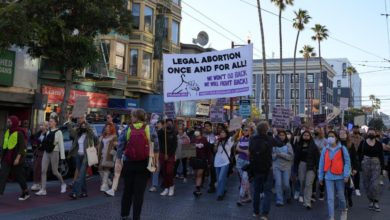State legislatures in Utah and South Dakota are each considering anti-abortion legislation.
In South Dakota, voters recently defeated an anti-abortion initiative that would have banned all abortions except to save
 |
If the bill was to become law, a woman would have to report the rape to police within 50 days and doctors would have to confirm the report before performing the abortion. In cases of incest, the victim would have to identify the perpetrator. In all cases, medical personnel would be required to turn over to police the fetal tissue for DNA testing in legal proceedings.
Women’s rights advocates point out that these requirements revictimize those who have already been sexually abused or assaulted. If the bill is signed by the governor, it will be placed on the 2008 ballot as a voter initiative.
Unwilling to pass a law that would undoubtedly face a legal challenge, costing the state money to defend, the Utah legislature instead has passed a bill that would outlaw abortion—with exceptions for rape and incest or to save the woman’s life—only if Roe v. Wade were overturned by the Supreme Court.
This stunningly courageous declaration of principle shows that the Utah state lawmakers’ opposition to women’s rights is only surpassed by their stinginess and willingness to let someone else fight their battles. As reported in a Utah paper, the Daily Herald, Rep. Steve Urquhart said that there are several other states that have introduced similar legislation, and that it makes more sense to let those states bear the financial burden of the litigation.
Both of these state-level legislative efforts reflect the effort by the anti-abortion movement to overturn the 1973 Supreme Court decision known as Roe vs. Wade. This decision legalized abortion in the United States.
Why is the Roe decision so important?
Women under the age of 35 in the United States have grown up never having known what it is to live without access to legal abortion services. Even women in their 40s have little personal experience about life without access to safe legal abortion.
This is not to say that the legality of abortion alone means that all women actually have access to this medical procedure. Abortion is not covered by federally funded medical programs; some private insurance will not cover it either. In some parts of the country, there is a shortage of qualified abortion providers, meaning women have to travel very far to get an abortion.
However, even when abortion was illegal, women continued to seek abortions and the procedure was driven underground.
Before Roe, countless women died or were injured during illegal abortions or by attempting to end a pregnancy on their own. Today, if a woman can afford the procedure and is able to get to a clinic, she can terminate an unwanted pregnancy without endangering her life and health.
Along with the ready availability of legal and effective methods of birth control, legal abortion means that women can control their own reproductive processes. Without freedom from unplanned and unwanted pregnancies, women are unable to participate fully and equally in the economy.
Reproductive rights encompass more than access to abortion or even to birth control. Reproductive rights also include assuring that women have the right to choose to start families and have healthy pregnancies.
For women to truly realize full reproductive rights, we need to have access to quality prenatal care, parental leave, childcare, affordable housing and living wage jobs.
Under the capitalist system, maintaining the second-class status of women is profitable for the capitalist owning class. Women are paid less for work of equal value while they contribute thousands of hours of unpaid labor in the home to produce the next generation of workers.
Under socialism, the prerequisites for true reproductive rights are built into an economic system that plans in order to take care of women’s rights and human rights, in general.





